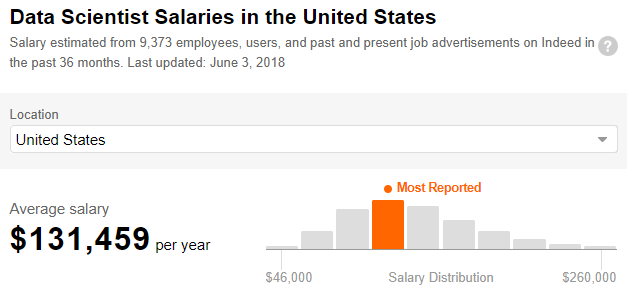Companies have been collecting data online for many years and the demand for data scientist positions, people who can interpret data, are at an all-time high.
- Inbox Dollars - Get paid to check your email. $5 bonus just for signing up!
- Survey Junkie - The #1 survey site that doesn't suck. Short surveys, high payouts, simply the best.
- Nielsen - Download their app and get paid $50!
As of mid-2018, businesses are always on the lookout for the best data scientist who can mine and analyze collected data, turning these into actionable insights.
The interesting thing about this job is that most universities do not have a program made for “data science.” Meaning, data scientists can come from various academic backgrounds and still be able to solve complex problems.
Great examples of popular data scientists today are U.S. Chief Data Scientist DJ Patil (took up Mathematics), Kirk Borne (studied astrophysics), and Facebook AI Director Yann LeCun (finished electrical engineering and computer science).
What is a Data Scientist?
A Data Scientist is someone who uses their knowledge in statistics, programming, mathematics, machine learning and business to “clean up” the data, discover possible solutions, and make sense of the information at hand.
At first, it can be daunting to use so much insider-knowledge for just one job, but as you perform the job itself, you’d understand that every data scientist has very-specific responsibilities depending on the needs of the company.
Data scientists work in the IT and business industries. Some specific job titles for data scientists include data mining engineer (examines in-house and third-party data), business intelligence analyst (uses data to come up with market trends), or data architect (create blueprints for data management systems).
The key to finding the perfect data scientist job is to read the fine print and dig deeper into the job description, since companies may assign a different job title than just using the general job title “data scientist.”
Data Scientist Salary: How much do Data Scientists make?
Entry-level data scientists generally earn around $60,000 to $100,000 per year. Senior-level data scientists can earn up to $200,000 annually.
The salary offers would depend largely on your skillset, experience level, and specialization. And since a data scientist can mean different things for different companies, here’s a quick guide of the most common job titles used (and their average salary):
- Business analyst – $50,000 to $65,000
- Business intelligence (BI) analyst – $45,000 to $65,000
- Analytics manager – $90,000 to $120,000
- Data analyst – $40,000 to $65,000
- Data scientist – $80,000 to $120,000
- Research analyst/scientist – $45,000 to $85,000
- Statistician – $60,000 to $90,000
- Director of Analytics – $110,000 or more
The job outlook of data scientists continues to be appealing. With millions of job openings (over 200,000 in the U.S. alone), those with the right qualifications won’t find it hard to apply to big-named companies like Walmart, Apple, Oracle and Microsoft, or go the work-from-home route and work freelance.
Companies know that hiring the right data scientist can be their secret to staying ahead of competition.
As demand for skilled data scientists to fill positions increase and as more companies discover the need to use insights from gathered data, salaries would likely increase as well.
If you’re wondering how to start a career as a data scientist, you’d need a good mix of non-tech and technical skills, several programming languages, critical thinking, problem-solving abilities, and strong communication skills (since you’ll likely be presenting your report to higher-ups who are not able to understand what these chunks of data mean).
How to Become a Data Scientist: 8 Skills You Need to Master
Ask any data scientist who landed jobs at popular firms and they’d tell you to focus on two main subjects – computer science and statistics. This is because any specialization you decide to take in the future would still include some form of data analysis.
Other studies that would be useful in this field include:
1. Mathematics
Remember when you were in high school and you question if calculus or algebra will ever have use in the real world?
Well, if you’re interested in a career as a data scientist, mastering the concepts of probability, multivariable calculus and linear algebra will get you a long way.
For companies with products that rely on data, a data scientist’s role is to continuously optimize algorithms or predict performance in order to increase revenues or reach other business goals.
Many interviewers will test your math skills by asking about past instances where you’ve implemented these techniques on the job, so it will only do your career good to brush up on these concepts.
2. Statistics
Most undergrad courses include an intro to statistics class – don’t skip it.
This class could potentially help you decide if you want to commit to a data scientist career. Unfortunately, it’s impossible to jump right into a data-based job without some statistics training.
No joke. Here are the fastest ways to make easy money online. Click here to see how.
Data scientists should be familiar with hypothesis testing, summary statistics, applied time series analysis, statistical distributions and maximum likelihood estimators, Bayesian Statistical Inference, Statistical Computing, Analysis of Categorical Data, and fundamentals of statistical data science, among others.
One of the most important statistics concepts you’ll use as a data scientist is to evaluate data and pinpoint which techniques or processes remain a valid approach and which ones aren’t.
3. Machine learning
Big companies with data-driven products, such as Uber or Google Maps, contain millions and millions of data that is impossible to evaluate manually.
Machine learning (as part of artificial intelligence) solves this problem by giving systems the “ability to learn” and improve through experience.
Understanding the tools and techniques of machine learning, such as ensemble methods, k-nearest neighbors, random forests, and so on, will help data scientists figure out exactly how algorithms work and decide which technique is the most appropriate for a specific scenario.
4. Data science
Data science is an inter-disciplinary field of scientific methods, systems, algorithms and processes that extract insights or knowledge from various structured or unstructured data.
Data scientists may use only one or all of the following techniques in their day-to-day jobs:
- Data cleaning/wrangling – Cleaning up, or dealing with data imperfections are inevitable. From timestamps vs. unix time, date formatting, inconsistent string formats (such as NY/New York/ny). This job is often performed by data science generalists or entry-level data scientists since it involves a lot of repetitive, but easy, organizing and cleanup tasks.
- Data visualization and planning – Start-ups often hire data scientists to help make data-driven decisions that would become a part of their overall long-term plan. Data scientists join the company, assess existing data and use data visualization tools like ggplot, matplotlib, and d3.js. Aside from the presentation part, communicating data must also be a skill you’re willing to learn since you’ll be interacting with fellow data scientists, clients, managers, engineers and so on.
- Data intuition – Data-driven problem solving is the main task of any data scientist. If you don’t have data intuition, you’d find it hard to move past many of your responsibilities. It’s essential to have the instincts to know when/why/where to use specific data and when/why/where not to.
- Big data platforms – Get acquainted with big data platforms (Hadoop, Hive & Pig, etc.) and software suites such as Dundas BI, Sisense, Domo, ClicData, Yellowfin and so on.
5. Programming
After a course in computer science, you can choose to master either statistical programming language such as Python or R, followed by C/C++, Java, Perl, SAS languages, and database querying language (like SQL).
You should also be familiar with cloud tools like Amazon S3.
Generally, you don’t need to code five or more languages if you can’t do all of them properly.
It’s better to specialize in one language to fit your data science profession. Python (used primarily by computer programmers) can be used in both data analysis and website development), while R (used by academics/researchers without IT background) in evaluating data.
If you don’t have formal training and would like to learn how to code on your own, start with intro to programming, machine-dependent programming, problem-solving programming, and data structures, among others.
6. Software Engineering
Software engineering isn’t a requirement for all data scientist jobs, but if you do have this training, you’ll have an advantage over your competition.
You’ll be able to handle data-driven product development, which is often reserved for senior positions.
Algorithm design and analysis, data structures, distributed computing, database systems, scientific computation, as well as image processing and analysis are ideal knowledge to have as a software engineer.
7. Industry Knowledge
No amount of technical skills will be enough, if you are not familiar with industry terms and concepts.
This is important regardless of which industry you land on, since you need to have a deeper understanding of how your industry functions and how data in this industry are collected, evaluated, and utilized.
You have to read everything you can about your company’s market, target audience, and trends.
Attend conferences, workshops and other industry events, whenever possible. If your job allows it, you should also embrace intellectual curiosity and explore new methodologies, techniques and territories to solve future problems.
You can make money from home and it doesn't have to be challenging. Click here to see how.
8. Non-technical Skills
When it comes to non-technical skills, the two most important skills to have in this field are analytical problem solving skills and communication skills.
As a data scientist, you should be able to handle real data with real scenarios and real workflow, employing the most appropriate method to solve these real-world problems every time.
You then have to explain or communicate data gathered, techniques you used and other information to an audience without IT or data science knowledge.
The Bottom Line on Data Scientist Jobs
In 2012, Harvard Business Review dubbed “data scientist” as the sexiest job of the 21st century. As the economy continues to be driven by data (even now in 2018), the future of this profession looks bright.
However, this isn’t the case when it comes to work-from-home data scientists. Although many companies have slowly been opening up to flexible working hours and remote setups, not all types of data scientists can take advantage of this.
If your job involves data analysis, crunching numbers and coding…and your company has the right tech to accommodate employees working remotely, then you’re lucky to have the option to work from home.
Unfortunately, senior positions or any data scientist who are required to present data to clients or higher-ups have no choice but to work office-based (unless of course your managers are open to video conferences).
Companies with sensitive data may also not allow its employees to access data outside their secured networks.
With this in mind, working from home as a data scientist can be a good option only on a case-to-case basis.
Sometimes, even if the company gives you the freedom to work from home, report via Skype (or other video conferences), and access data in the comfort of your own home, you may find logging into two secured networks frustrating whenever one of the networks fail to give you access.
If you’re lucky to find a data scientist job that encourages you to work from home, stick with it. It’s one of the legit work from home jobs with higher-than-standard salary in the IT industry.






